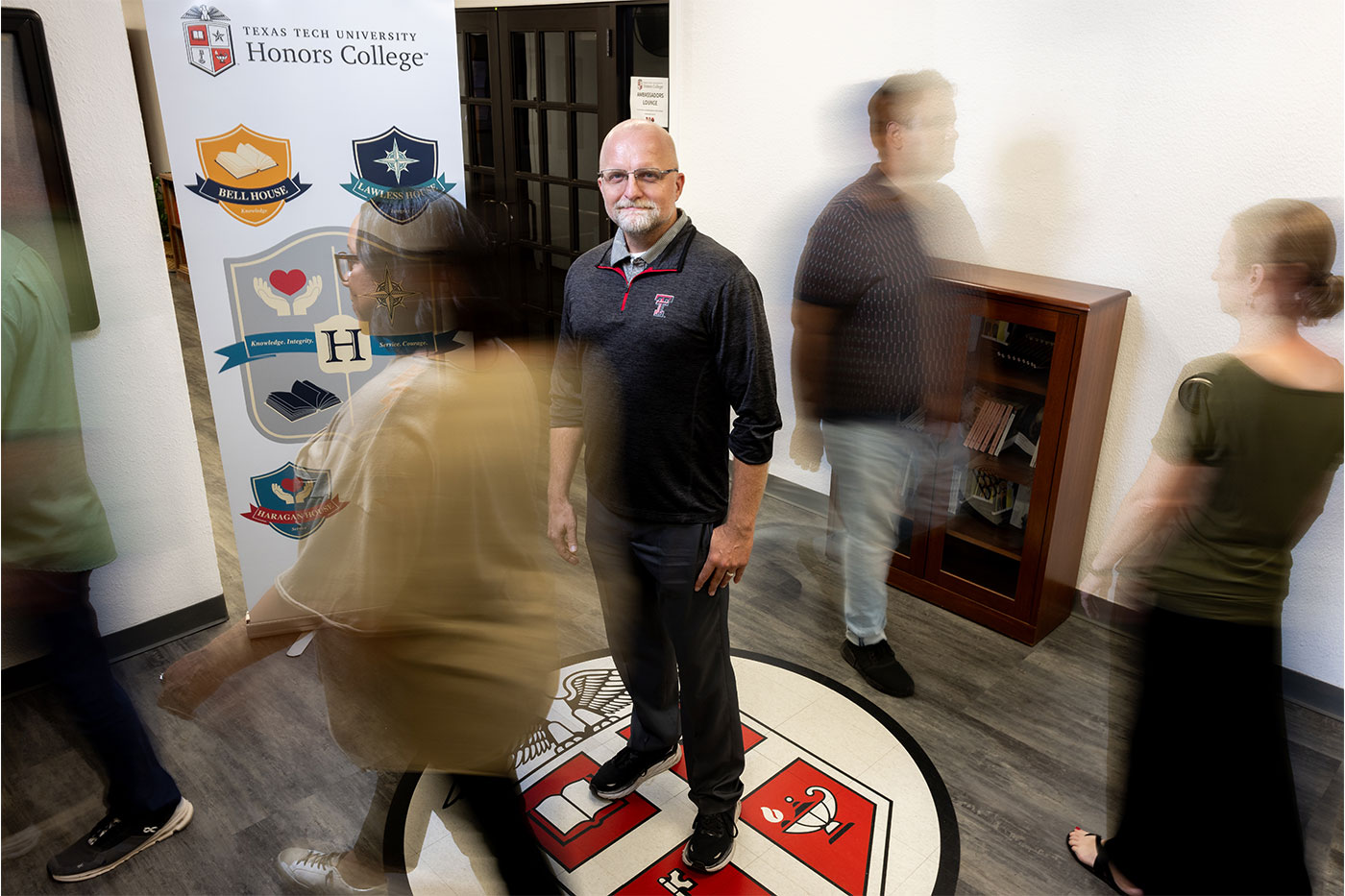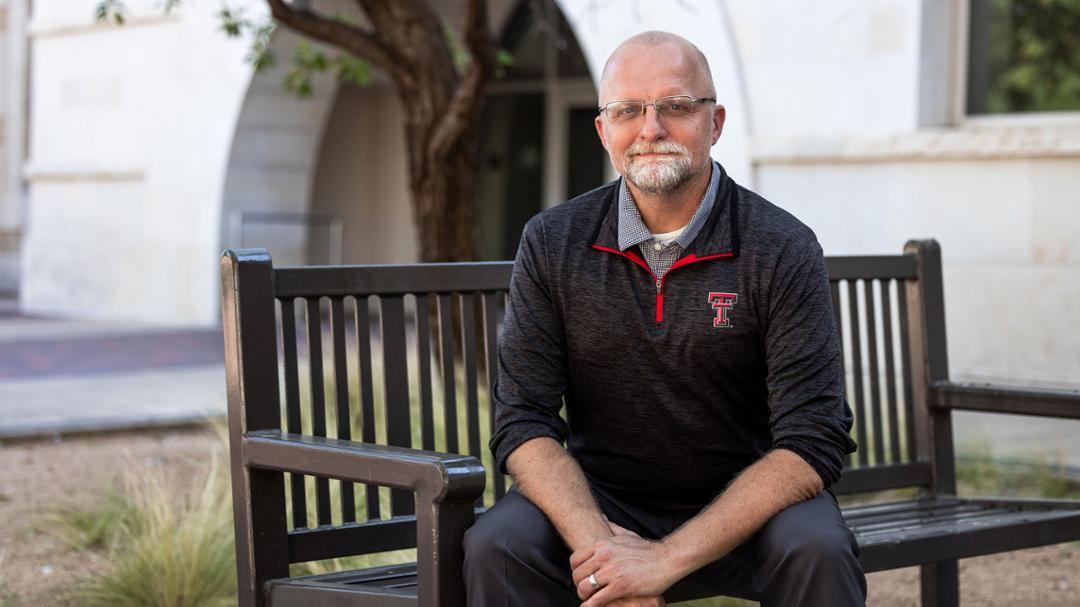Assistant Dean Chad Cain has worked to drive recruiting efforts through intentional outreach and strategic campus collaborations.
The leadership of Texas Tech University’s Honors College was planning only for a modest increase in the size of its incoming first-year class.
That was early in 2024. The college, led by Dean Jill Hernandez, has been intentionally measured and strategic in its approach, planning for steady, manageable enrollment growth. That way, when students reach campus, they are greeted with the personal touch and program differentiators that make the college an attractive and appealing destination.
But a funny thing happened along the way. That was then and this is now.
Chad Cain, assistant dean for enrollment in the Honors College, saw in early April that the numbers were trending upward – and doing so at a rapid clip. The increase was something of a surprise considering how a handful of issues had hampered the rollout of what was billed as a simplified Free Application for Federal Student Aid (FAFSA).
“The high-water mark for us was 602 students,” Cain said. “Our financial aid team should be commended for their great work in getting families processed. Imagine families with a child in college for the first time. We had a group of students who were focused, committed and discerning in their college choice.”
Once the flurry of activity wrapped up, the Honors College finished with 554 students confirmed for its first-year class that will arrive on campus next month. A year ago, the number was 433.
However, this year’s group isn’t just one of quantity. It is also one of quality as only 14% of the group was provisionally admitted compared to last year’s 31%. Provisional admittance means the Honors team has noticed something in an application requiring early attention and resources to ensure student success.
“Chad’s assiduous efforts at direct recruiting and our strong partnership with admissions is making the case that these amazingly accomplished students see the Honors College as the reason to come to Texas Tech,” Hernandez said.
“I think the word is out about what an amazing place the Honors College at Texas Tech is.”
In addition to standard application paperwork, Honors students are required to sign a contract that reinforces their commitment to the college and university. The typical deadline for this is May 1, but with the challenges of FAFSA, the Honors team considered moving the date back two weeks.
Going into the year, Hernandez and her leadership team weren’t sure about the size of the incoming class. Early thinking held it might be about the same or possibly slightly smaller from the previous year. Then came the early indications the group was going to be larger.
“Chad came in on the morning of April 10 and, by way of giving me a heads-up, said we were up a little,” Hernandez recalled. “I asked what that meant, and he said he wasn’t sure yet.”

Later that day, though, the class had swelled to 499 students with only 14% provisionally admitted. The decision was made not to extend the deadline and instead focus on students who had applied but not signed up for Red Raider Orientation to gauge their commitment.
“We sent an email to students that said, ‘We are so excited to welcome our largest and most academically excellent class. However, you have not signed up for Red Raider Orientation, and we need you to seal that commitment this weekend so we will have a class for you,’” Hernandez said. “We got a really robust response to that.”
The incoming class arrives on the heels of the Honors team’s excellent work in student retention, which has increased almost 25% from spring 2023 to spring 2024.
“Students see the advantage to being part of our Honors community,”
“We offer smaller classes, paid research on day one that you cannot get anywhere else and the opportunity to receive mentorship by virtue of our First-Year Experience program," Cain said. "All that combined with great communication from our advisers adds up to tangible guidance that is reassuring.”
With its enrollment numbers largely stabilized, the college’s strategic plan called for modest growth among incoming students as it works toward a total student headcount of 2,200 by 2027. The sweet spot of success is found in balancing retention and recruitment efforts.
Cain has been a driving force in that work, focusing on growing enrollment numbers through targeted student outreach and exceptional alliance building elsewhere on campus.
“We have strategically done some things differently the last two years, and that is why our yield rate is so high,” Hernandez explained. “Chad has been instrumental in all of this work. Our partnerships with financial aid and admissions are absolutely amazing, and our focus has been on experiences unique to the Texas Tech Honors College.”
For example, Cain has made personal visits to numerous high schools beyond Lubbock County. He has invested time explaining the specialness of the Honors community as well as its values. He points to the Honors College Externship Program as a point of connection that gives students a practical early window into what they might want to do (or not do) on a specific career path.
Cain also oversees the college’s group of student ambassadors, 30 high achievers who are among its most visible advocates and eagerly share how the college positively altered the trajectory of their life. Ambassadors are regular fixtures at Honors events, where their stories are highlighted for prospective students.
“I think families are resonating with Chad’s message about Honors,” Hernandez said. “He explains that we will prepare students regardless of what they think their future might look like. We have programs that will foster and mentor students, and that is a promise we make to every student we admit.”
Cain deflects such praise, focusing instead on the transformative experience the Honors College can have for students. He said the key to success now and in the years ahead will hinge on the ability to maintain the standard of excellence throughout Honors.
That translates to a continuing emphasis on smaller class size, innovative and creative instructors and programs that differentiate Texas Tech on the Honors landscape.
“We don’t want to dilute the experience of the Honors College for anyone,” he said. “Our focus continues to be on ensuring this is a rich experience that allows them to see all the benefits of being part of this community.
“What is interesting is in the broader context, we did not know what was going to transpire with FAFSA. The partnerships we benefit from help us make meaningful connections with students. I get to work with our ambassadors as well as students and volunteers who share their experiences and reassure high school juniors and seniors. And I have a front-row seat for this.”

